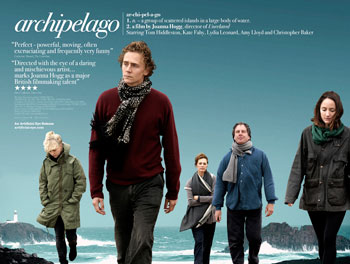LFF: Archipelago – 4*
 The latest art-house drama and 2010 London Film Festival entry from Joanna Hogg remains loyal to her fascinating and confident film-making style of lengthy character improvisation. Archipelago is certainly not to everyone’s taste, almost Cinéma vérité in nature, but without depicting real-life events. It’s also a very slow burner that gives the opportunity to ‘people watch’ on screen. It demands our attention and patience in letting events play out, as we gaze at its landscape beauty. When the subject matter is as strong as it is in Archipelago, the drama speaks volumes for itself, often without a word uttered.
The latest art-house drama and 2010 London Film Festival entry from Joanna Hogg remains loyal to her fascinating and confident film-making style of lengthy character improvisation. Archipelago is certainly not to everyone’s taste, almost Cinéma vérité in nature, but without depicting real-life events. It’s also a very slow burner that gives the opportunity to ‘people watch’ on screen. It demands our attention and patience in letting events play out, as we gaze at its landscape beauty. When the subject matter is as strong as it is in Archipelago, the drama speaks volumes for itself, often without a word uttered.
Archipelago follows a middle/upper-class family dynamic of a grown-up son (Tom Hiddleston) and daughter (Lydia Leonard) on holiday on the windy Isles of Scilly with their mother (Kate Fahy), as they await the arrival of the obvious patriarch of the family, their father. The scene is set in idyllic and stunning surroundings, designed to cultivate rest and creativity. But among all the exquisite beauty and ample time to think, away from the stress of their normal lives, deep-seated tensions begin to crack the family’s otherwise civilised and privileged exteriors. The spiral effect is aided by the continual absence of the father, and not helped by the presence of ‘outsiders’ to the party, in the visiting artist (played by Christopher Baker) and Rose the cook (Amy Lloyd) who both taken on roles as peacemaker/counsellor and unwilling instigator at various points throughout the film.
The static nature of the wide-angled camerawork is almost voyeuristic in tone, as though you happened to be listening into the family’s conversations on the mountainside during their private picnic, or in their living room – like the proverbial ‘fly on the wall’. There are the softly spoken digs at each other, sometimes dripping with sarcasm, that lead to the off-camera rows needed to clear the air – as portrayed by the open windows and billowing net curtains, airing the stale cottage atmosphere.
In fact the four walls that seem like the perfect retreat become a prison of fractured emotions. It seems that escaping them returns each troubled character’s solace, but eventually, there is no escape as the Isle’s clouds build, and force confrontation. It is a take on the meaning of the word ‘Archipelago’ – a group of islands – as each family member feels remote and isolated in what should be one of the most unifying and relaxing situations. This is also a perfect example of the infamous phrase: “You can chose your friends, but you can’t chose your family”.
The performances from all the cast are faultless, with Leonard as the prickly, judgmental and deeply unhappy daughter, Cynthia or ‘C’, as one of the most obnoxious screen females in recent record. The fact that she attempts to curtail her emotions with clipped remarks only goes to suggest more poisonous thoughts and beliefs. Her lack of respect and treatment of Rose is reminiscent of an old-school imperial structure, with her referring to her as ‘Cook’. Hence, we favour the son, Edward, even though he is equally flawed with his over-sensitivity and carefree will that borders on selfishness. Neither character deserves our approval. This makes for enthralling viewing of sibling rivalry.
Hogg only allows us to get closer to her leads – via camera angles – when they have had a chance to compose themselves, almost placing us at a ‘safe’ distance the majority of the time from the building tensions. It’s as though to be nearer to them would be considered too ‘intrusive’, as well. The result is an incredibly uncomfortable one and you feel a sense of relief when the camera returns to its wider framing.
Those attracted to intense character studies will appreciate how Hogg produces her vision. It may not have the humorous ramblings of a Mike Leigh film, opting for a serious, pseudo-documentary stance. But its equally selective dialogue gives Archipelago a distinctive power and engaging aura, unlike anything you may have experienced before.
4/5 stars
By @FilmGazer